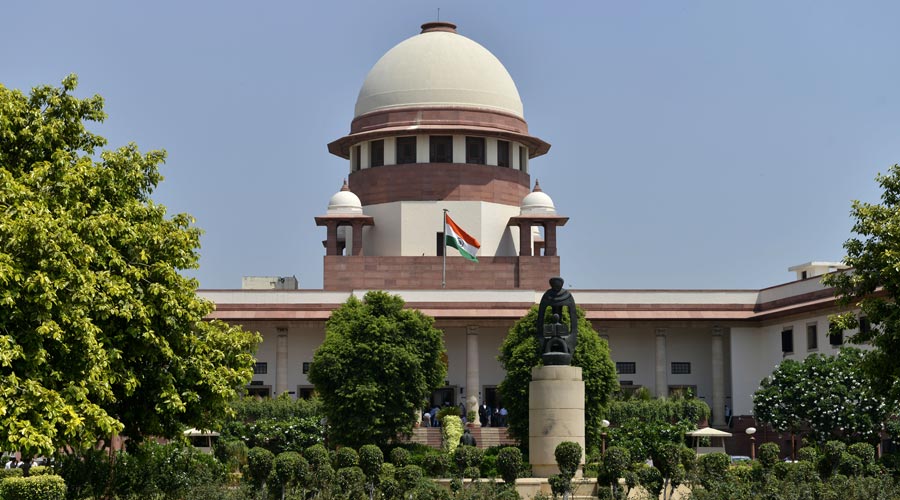The Supreme Court on Tuesday struck down as unconstitutional the jail terms and the retrospective reach of the law prohibiting benami transactions.
The original Prohibition of Benami Property Transactions Act, 1988, provided for a maximum of three years’ rigorous imprisonment. The jail term was raised to seven years through an amendment in 2016.
In effect, the top court has now struck down both the 1988 jail provision as well as the 2016 amendment that increased the duration in prison.
A bench of Chief Justice N.V. Ramana and Justices Krishna Murari and Hima Kohli also ruled that the Benami Transactions (Prohibition) Amendment Act, 2016, does not have retrospective application. The authorities cannot initiate or continue criminal prosecution or confiscation proceedings for transactions done before the amended legislation came into force.
Benami transactions are sham dealings either to avoid tax or other liabilities. An example: Person A purchases a property from B in the name of C (benamidar/ostensible owner) and A exercises the rights/interest over the property.
The Supreme Court passed the judgment while disposing of an appeal filed by the Union government challenging a Calcutta High Court order of December 12, 2019. The high court had held that the amended provisions of 2016 cannot be applied with retrospective effect. The high court had passed the judgment while dealing with an appeal filed by Ganapathi Dealcom Pvt Ltd.
The Supreme Court said that Section 5 of the 1988 Act, which says benami properties are liable for acquisition, was unconstitutional for being manifestly arbitrary. It said the provision of forfeiture under Section 5 of the 2016 Act can only be applied prospectively, and not retroactively.
“In view of the fact that this Court has already held that the criminal provisions under the 1988 Act were arbitrary and incapable of application, the law through the 2016 amendment could not retroactively apply for confiscation of those transactions entered into between September 5, 1988, to October 25, 2016, as the same would tantamount to punitive punishment, in the absence of any other form of punishment,” the court said.
Writing the judgment, CJI Ramana noted that Sections 27(3), 5 and 67 of the 1988 Act allowed for a confiscation procedure that was distinct from the procedure contemplated under the CrPC or any other enactment in India.
Under the 1988 Act, property can be attached even before the trial, while under the other laws, it can be done only after the completion of trial.
“This separation of the confiscation mechanism is not merely procedural. It has also altered substantive rights of the evidentiary standards from ‘beyond reasonable doubt’ to ‘preponderance of probabilities’,” the Supreme Court said. “Such a change of standards cannot be merely termed as procedural,” it added.
“When such a taint is being created not on the individual, but on the property itself, a retroactive law would characterise itself as punitive for condemning the proceeds of sale which may also involve legitimate means of addition of wealth.
“The authority that initiates such confiscation is granted extensive powers of discovery, inspection, compelling attendance, compelling production of documents,” the bench said.
The bench also said the recent judgment by the Supreme Court in a Prevention of Money Laundering Act case justifying confiscation of property in exceptional cases required reconsideration as it might otherwise lead to arbitrary application.
The bench said on Tuesday: “If this Court reads criminal provisions of the Benami Act to have had force since 1988, then the following deleterious consequences would ensue: (i) Section 187C of the Companies Act, 1956, assured protection to nominal and beneficial holding of shares if the prescribed declaration duly made are at serious risk. (ii) Benami cooking gas connections which have been regularised from time to time are at risk. (iii) Housing colonies and benami allotments of DDA flats which have been regularised from time to time are at risk.”
The court felt that Section 3 (criminal provision) read with Section 2(a) and Section 5 (confiscation proceedings) of the 1988 Act were overly broad, disproportionately harsh and operated without adequate safeguards in place.
“Such provisions were stillborn law and never utilised in the first place. In this light, this Court finds that Sections 3 and 5 of the 1988 Act were unconstitutional from their inception,” it said.











